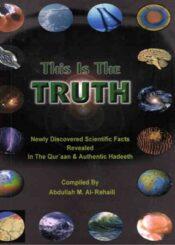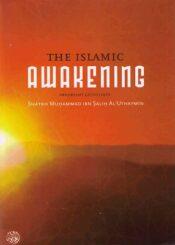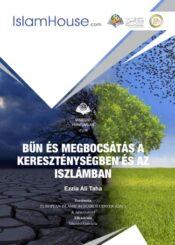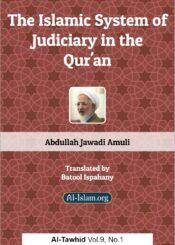The role of religion in the formation of the “Ummah Wahida”
The role of religion in the formation of the “Ummah Wahida”
0 Vote
294 View
By: Sayyid Ahmad Rahnamaei Ever since Islam was first revealed, Muslims have been encouraged to live together and to work towards establishing a single Muslim nation embracing all Muslims around the world. The Qur’an, in explaining the role of the prophets, goes beyond the concept of one Muslim nation and explains how humankind used to be one community, but because of internal disputes became divided: (All) people were a single nation, so Allah raised prophets as bearers of good tidings and as warners; and with them He revealed book with the truth, so that it might judge between people in that in which they differed and struggled; and none but the very people who were given the book, after clear signs (and arguments) had come to them, differed about it, due to their selfish contumacy. [50] This verse is addressed to all people belonging to the human race. [51] Allamah Tabataba’i states: This verse refers to the beginning of humanity when they were united, lived a simple life and had simple thoughts. There were no differences or any tug-of-war in matters of life or livelihood, nor were there any disagreements about religion or religious matters. [52] During the early period of human history, there were no considerable struggles over matters affecting both everyday life and religious beliefs. Year after year, and generation after generation, human beings have been continuously climbing “the heights of knowledge and thought and ever progressing along the path of learning and culture.” [53] Day by day new ways to improve human civilization are found, and newer instruments invented “to make life more and more comfortable.” [54] People in primitive times did not become entangled in any serious disagreements; “nor there occurred among them any lasting differences.” [55] However, since human beings possess “the natural urge to take advantage of others” and have a natural need to cooperate with others, they cannot avoid quarrelling with one another. Since some individuals were stronger in body and mind than others, they used to take more from the weaker “than they gave them in return.” Thus, human mind was occupied by two different motivations with two opposite consequences. On the one hand “whenever he used a newly-acquired expertise, it opened new avenues of progress and dexterity for him.” On the other, he was in need of cooperation with others. [56] Allamah Tabataba’i states: It may seem strange that the same natural urge compelled men to remain together, on one hand, and led them to quarrel and find differences on the other. But ... there is a third faculty above them to judge and decide, and to create a balance between them. [57] I have paraphrased at length Allamah Tabataba’i’s interpretation of the verse 2: 213 to show that according to his interpretation, God’s prophets, whose major responsibility was to call people to the religion of Oneness and to establish a monotheistic religious nation, were the great architects of the ummah wa-hida. For the sake of unity, people of all nations and races are asked to follow the path set down by those guides who themselves have been guided by Allah. Muslims, regardless of national, racial, tribal, and ethnic differences, are expected to follow the Prophet Muhammad as the Seal and as the Last of the prophets. They are called to embrace Islam with their whole existence and to worship one God, follow one prophet, acknowledge one book, one shari‘ah and one direction, so that they might form one single community, even though they may be from different nationalities or territories. The same Qur’anic verse encourages people to form a single community and avoid any conflict among them. However because of moral, behavioural and practical problems such as selfishness, greed, ungratefulness, injustice, etc., human beings have always contended with one another, except for those who sincerely believe. Accordingly, the best way to establish a real single community is to follow the teachings of Allah’s prophets and to adhere to the divine religion revealed to them. Since the messages of all the prophets fundamentally are the same, as they all call attention to the Oneness of God and belief in the Hereafter, their sincere followers, by respecting these principles, may get along together more comfortably than unbelievers. The uniqueness of the divine religion is manifested in the following verse: “Verily, the only religion before Allah is Islam”, [58] illustrating that all messengers had basically the same path and religion. Allamah Tabataba’i states concerning the interpretation of the Qur’anic passage: “the verse explains why religion was promulgated and mankind obliged to follow it, and why differences occurred in it.” [59] Going into more detail, Allamah explains that religion plays an important role in the formation of a single ummah. The creation of a single ummah is a goal which is in harmony with the nature of humankind. He maintains that “mankind having been created with a natural urge to remain together and cooperate with each other, were in the beginning one single group.” Disputes however occurred that caused them to lose their togetherness. As a result of differences and disputes, people were divided into different groups and sects. These differences occurred either because of “the acquisition of the necessities of life” or “because of the revolt of the very people who were given the book, after the fundamentals and characteristics of religion had been fully explained to them and the proof of Allah had been completed for them.” [60] No factor other than divine religion, such as nationality, language, race, blood, territory, etc. can bring people under a single umbrella; rather, they by themselves may introduce differences of opinion. In this regard, what the verse is implying is that there are two sorts of differences: “first, the differences based on worldly gains, which was but natural; second, the differences regarding religious matters which were based not on nature, but on the revolt of mischief-makers.” [61] To remove both kinds of differences, Allah created divine laws based on true faith, fine character and good actions. [62] Based on this interpretation, Allamah remarks that the problem of human differences can be solved only by means of divine religion, whose perfect role within human society can help in the formation of one single ummah and the establishment of social justice. He states: The divine religion is the only means of happiness and felicity for the human species, and it keeps life in order. It creates a balance between various human instincts and urges, and keeps them on the middle path, preventing them from going towards either extreme. Thus, there appears the best system and the highest discipline in the human life both of this world and of the Hereafter, the material as well as the spiritual. [63] Here, “an outline of the social and religious history of human beings” is given in the verse. [64] Due to the premise that human beings are social by nature, there is a natural instinct to take advantage of others just as others may benefit from him. This ‘give-and-take’ promoted men to live in society and to cooperate with each other in their affairs. It necessitated the safeguarding of the rights of every member of that society to keep a balance between their rights and their duties. This is called social justice. [65] Throughout history, social justice has been the chief goal of human beings. However, this same history shows that because of the negative aspects of character, human beings always engaged themselves and their fellows in personal and social problems. Consequently, they let difficulties and disasters develop and remain unsolved. Some of the characteristics of human beings are mentioned in the Qur’an as follows: “Surely man is unjust, ignorant” [66]; “Surely insan is created avaricious” [67]; “Surely insan is unjust, very ungrateful” [68]; “Nay! Verily insan is wont to rebel as he sees him/herself free from want.” [69] With respect to such comments, Allamah remarks: This is why whenever a man acquires power over his fellows, the dictates of social justice are forgotten; and the mighty one ignores the rights of weaker ones. It is as much true in the case of individuals as in that of nations and states; and this has been going on from the early history of mankind until the present, which is called the age of civilization and freedom! [70] This is a common problem for human nations including Muslim societies all around the world. It is clear that ever since it emerged within the Muslim world, nationalism, inasmuch as it is mostly a political movement, has not been yet able to overcome such problems. From a historical point of view, the wave of nationalism among Muslim societies dates to the late nineteenth century. The phenomenon of national consciousness emerged first in Europe and then manifested in other continents including Muslim countries. Due to some political reasons, the first inspiration of nationalism showed itself in the territories of Ottoman Empire. [71] Nationalism, though it may answer some of the needs of a nation or eliminate certain of its problems, can never remove them all; in fact it is likely to cause further problems. Thus, there has always been a vital need for a strong and authentic instrument by means of which human beings may do away with their personal and social problems and bring social justice into practice. Allamah, writing of the differences and disputes that have resulted in people failing to remain as a single community, insists that divine laws, based “on the belief of the oneness of Allah, on true faith, on fine character and good deeds” provide the only solution. [72] Within the framework of the constitution of Islamic society, the afore-mentioned points are significant. Islamic society is something of a phenomenon in our present time, potentially maintaining as it does a certain unity in spite of the fact that it is composed of several nationalities, and these widely separated geographically. Today, Muslims all over the world are members of this society, sharing many common ideas, feelings and causes. Establishing brotherhood, [73] the Qur’an encourages believers to have as well as to show a powerful sympathy and integration between them. In fact, it has only been because of military or political matters, or perhaps due to colonial interference, that Muslims, albeit unwillingly, have separated from each other. As was mentioned before, in recent centuries, the Western powers have been one of the main causes of this separation. However, nothing has been able to destroy the basis of the unity which is rooted in the faith and implemented in the hearts of Muslims. As Iqbal, the great poet, says, “the truth is single one; though our tents (homes) are not connected to each other, our hearts are alike and united.” The annual pilgrimage (hajj) to Mecca during the month of Dhi’l-Hijjah is a remarkable gathering of Muslims of every nationality, and an indication of the importance that they attach to the principles in which they believe in common. The cooperation manifested in the hajj may be regarded as nothing less than a model for a potential or real United Muslim Community. The Problem with Religious Nationalism Peter Van der Veer, in his work Religious Nationalism wherein he offers a case study of Hindu and Muslim religious struggles in India, tries to interpret this phenomenon by describing it as ‘religious nationalism’. It is doubtful however whether such a problematic doctrine truly reflects reality or is merely an unfounded allegation. The author himself, being aware of this problem, says, The claim that something like religious nationalism exists will be rejected by many students of nationalism for the simple reason that both nationalism and its theory depend on a Western discourse of modernity. This discourse constitutes the ‘traditional’ as its antithesis and interprets difference as backwardness. A crucial element of the discourse of modernity is the opposition of the ‘religious’ to the ‘secular’. Van der Veer’s response to this objection does not seem satisfactory. He points out two factors which are to him necessary for understanding religious nationalism in India: first, “an analysis of ‘traditional’ that is not prejudiced by the discourse of modernity” and second, “a theory of the impact of colonialism and orientalism that does not deny agency to colonial subjects.” [77] Van der Veer’s main illustration of his argument depends on just one event that happened in Ayodhya, an important religious centre in India. [78] There was an old mosque in Ayodhya “that had been long under dispute between Hindus and Muslims.” This site, according to Hindu tradition, was the birthplace of Lord Rama the prime god of Ayodhya.” Van der Veer describes the event as such: In 1982, however, the relative peace of the place was suddenly disrupted when a campaign ‘to liberate the birthplace of Lord Rama’ was launched. The initiate was taken not by local monks but by a Hindu nationalist movement with branches all over the country. [79] ... Hundreds of people have died in riots between Hindus and Muslims. [80] Finally, on 6 December 1992, the mosque was demolished by a Hindu mob. Van der Veer concludes that: The Ayodhya case reflects all the elements of religious nationalism in which I have come to be interested. While this book is not principally about Ayodhya, the Ayodhya case is taken here as the main illustration of my argument. [81] He then attempts to show that religious nationalism “builds on a previous construction of religious community.” [82] What may be said in response to Van der Veer’s argument is that the case of Ayodhya reflects nothing more than a rigid religious bias and prejudice on the part of both Hindus and Muslims against one another. Like many disputes between people of different religious rites and sects, the Hindu-Muslim prejudice in the case under study is concerned with the religious traditional heritage of both sides and not with their nationalism. This comment seems sound when one considers the definition of nationalism as being opposed to religion and religious customs. Even the distinction between the sacred languages of Hinduism and Islam, as it is another aspect of Van der Veer’s argument, [83] cannot support the idea of religious nationalism, because first, it is problematic to state that language itself may play an important role in the formation of nationalism, and second, the sacredness of language is more relevant to the description of a religion than of a nationality. Another case-example of the so-called religious nationalism is illustrated by Martha Lee. Considering the African American movement, Lee goes on to elaborate a kind of the black Americans’ religious movement. Her attempts have no further result than to affirm a significant role and place for religion in awakening the black nation of America. There is no doubt that religion played such an important role in encouraging the black nation to re-discover their humanity and identity and in helping them to direct their destiny. [84] Martha Lee remarks: The Black population of the United States has long struggled to find its identity in the context of the society and republic in which it must exist. This struggle is not surprising; the political question “who are we?” must be answered by reflection upon and interpretation of the past. ... As Black Americans know well, slavery is an institution that denies humanity and political visibility. A restoration of their community therefore requires a comprehensive explanation of their origins and an interpretation of the meaning of their existence. [85] The same author then concludes: “One of the most appropriate ways to examine this problem is through religion.” [86] In reaction to what Lee indicates, I believe one should be cautious about interpreting or recognizing this role of religion as religious nationalism. Due to their respective principles and characteristics, Islam and nationalism each has its own message, teachings and space. We have seen that since the very beginning, Islam has discouraged tribalism, racism and prejudice in all of their forms. This discouragement extends itself to the realm of nationalism in the modern age. In fact, considering its negative attitude towards nationalism, it cannot be said that Islam regards internationalism in any more positive a light. This is because the concept of internationalism is too restricted to represent Islamic social thought. The idea that emerges out from within the Qur’an and Islamic tradition indicates that Islam, on a universal scale, calls for the creation of a single community and encourages humankind to practice justice and to live in peace. Imam ‘Ali, in his address to Malik Ashtar on appointing him as the governor of Egypt, wrote: Remember, Malik, that among your subjects there are two kinds of people: those who have the same religion as yourself and they are brothers unto you and those who have other religions than yours and yet are human beings like you ... Let your mercy and compassion come to their rescue and help in the same way and to the same extent that you expect God to show mercy and forgiveness to you. [87] Although nationalism did emerge within the Muslim world, nevertheless, the movement was never derived from Islamic teachings. The only thing that we may find in Islamic tradition is a hadith that advocates devotion to one’s nation: “One’s love for his country is a matter of faith.” Some Muslim scholars believe that this saying contains a mystical rather than a patriotic message. The famous poet Iqbal says, “Our hearts do not belong to any homeland, whether it be Greece, India, Syria or elsewhere. In fact, there is no border encircling us or defining us other than Islam.” [88] Regardless however of its mystical sense, the hadith encourages Muslim believers of every nation to work hard in achieving material benefit for their respective homelands. It urges them to make progress in every field of knowledge in order to meet, and thus avoid having to be dependent on non-Muslim countries. Again the hadith, heartening Muslims to show their love for and loyalty towards their homelands, declares a supranational message for all Muslim nations and does not restrict itself to a specific nation. [89] As Soekarno states, “...true Islam requires all its adherents to love and to work for the country in which they reside, to love and to work for the people among whom they live.” [90] Finally, love and loyalty are derived from our instinctive feelings and consciousness, whereas nationalism is an ideology whose birth place was the political arena. [91] The people of a nation may express the same love and loyalty towards their great figures of science, their national pride, their epic history and all their distinguished achievements. Islam, which encourages Muslims to respect their own material and spiritual values and wealth as well as to be independent and steadfast in their loyalties, is certainly not opposed to this kind of attitude. Muslims are allowed to take pride in their nation loyalties so far they do not encourage or cause any prejudice in theory or in practice. The Qur’an condemns only those who sacrifice the faith by clinging to ancestors or by aping national figures. There is no problem as such with imitating these personalities so long it does not conflict with Islamic teachings. In accordance with the divine teachings and prophetic missions, Muslims are requested not to follow the example of any one whose path is in direct contradiction to God’s commands. [92] As depicted in the Qur’an, prophets were continually being responded by their people that what they taught “was against the prevalent customs and traditions of the country” and those of their ancestors. The prophets strived to call people to the Oneness of God, to the monotheistic faith, but the people’s response was that they observed their fathers’ customs and wanted to follow them. [93] A global education seems necessary to ultimately create mutual understanding and cooperation between the different nations of the world. It is the obligation of Muslim educators in particular and all others in general to cooperate with one another in order to provide a peaceful global environment. The survival of our planet earth greatly depends upon our carrying out this obligation. Source: alhassanain.com






